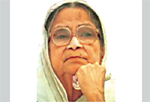 Today is the 15th death anniversary of Sufia Kamal, a renowned poet and a pioneer of women’s rights movement in Bangladesh. She received Independence Day Award, Ekushey Padak, Bangla Academy Award, Deshbandhu CR Das Gold Medal, and many other national and international accolades. Born in the Shayestabad’s Nawab family in Barisal, Sufia Kamal (June 20, 1911 –November 20, 1999) was not just a poet but an iconic figure who dedicated her life to empowering women. She was also at the forefront of all political, social and cultural movements during her lifetime to establish human rights and achieve women’s emancipation.
Today is the 15th death anniversary of Sufia Kamal, a renowned poet and a pioneer of women’s rights movement in Bangladesh. She received Independence Day Award, Ekushey Padak, Bangla Academy Award, Deshbandhu CR Das Gold Medal, and many other national and international accolades. Born in the Shayestabad’s Nawab family in Barisal, Sufia Kamal (June 20, 1911 –November 20, 1999) was not just a poet but an iconic figure who dedicated her life to empowering women. She was also at the forefront of all political, social and cultural movements during her lifetime to establish human rights and achieve women’s emancipation.
Sufia was instrumental in establishing different socio-cultural organisations including Bangladesh Mahila Parishad, Chhayanaut and Kachi Kanchar Mela.
She also took part in the non-cooperation movement called by Mahatma Gandhi and wove thread on charka as a mark of protest. Inspired by her husband Syed Nehal Hossain, she wrote a short-story Sainik Badhu and a few poems which were published in a literary journal.
She got involved in literary activities and later was acquainted with Kazi Nazrul Islam and Mohammad Nasiruddin, who inspired her greatly. Showgat editor Nasiruddin inspired Sufia Kamal to engage herself into writing.
Sufia’s first poem, Bashanti, was published in Saogat magazine in 1926. In 1931, she became the first Bengali Muslim female to be the member of Indian Women Federation. In 1937 she published her first collection of short stories named Keyar Kanta.
Different socio-cultural organisations have chalked out various programmes, including discussion and cultural function, to pay tribute to the poet.
-With New Age input




















